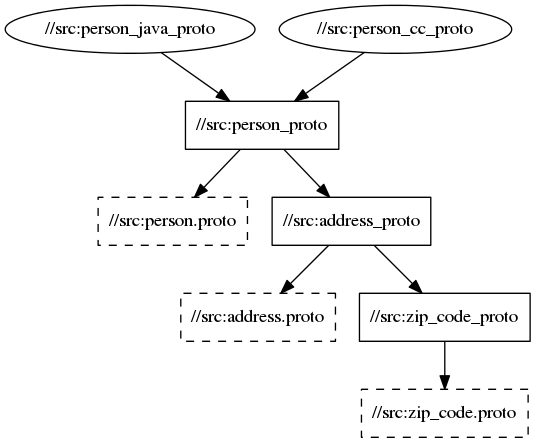Bazel currently provides rules for Java, JavaLite and C++.
proto_library
is a language-agnostic rule that describes relations between .proto files.
java_proto_library,
java_lite_proto_library
and
cc_proto_library
are rules that "attach" to proto_library and generate language-specific
bindings.
By making a java_library (resp. cc_library) depend on java_proto_library
(resp. cc_proto_library) your code gains access to the generated code.
TL;DR - Usage example
TIP: https://github.com/cgrushko/proto_library contains a buildable example.
WORKSPACE file
Bazel's proto rules implicitly depend on the https://github.com/google/protobuf distribution (described below, in "Implicit Dependencies and Proto Toolchains"). The following satisfies these dependencies:
TIP: Clone https://github.com/cgrushko/proto_library to try protobufs in Bazel now.
Update (February 2020): Starting with Bazel 3.0, the minimum Protocol Buffer version required is 3.11.3. See this issue for more information.
load("@bazel_tools//tools/build_defs/repo:http.bzl", "http_archive")
# rules_cc defines rules for generating C++ code from Protocol Buffers.
http_archive(
name = "rules_cc",
sha256 = "35f2fb4ea0b3e61ad64a369de284e4fbbdcdba71836a5555abb5e194cf119509",
strip_prefix = "rules_cc-624b5d59dfb45672d4239422fa1e3de1822ee110",
urls = [
"https://mirror.bazel.build/github.com/bazelbuild/rules_cc/archive/624b5d59dfb45672d4239422fa1e3de1822ee110.tar.gz",
"https://github.com/bazelbuild/rules_cc/archive/624b5d59dfb45672d4239422fa1e3de1822ee110.tar.gz",
],
)
# rules_java defines rules for generating Java code from Protocol Buffers.
http_archive(
name = "rules_java",
sha256 = "ccf00372878d141f7d5568cedc4c42ad4811ba367ea3e26bc7c43445bbc52895",
strip_prefix = "rules_java-d7bf804c8731edd232cb061cb2a9fe003a85d8ee",
urls = [
"https://mirror.bazel.build/github.com/bazelbuild/rules_java/archive/d7bf804c8731edd232cb061cb2a9fe003a85d8ee.tar.gz",
"https://github.com/bazelbuild/rules_java/archive/d7bf804c8731edd232cb061cb2a9fe003a85d8ee.tar.gz",
],
)
# rules_proto defines abstract rules for building Protocol Buffers.
http_archive(
name = "rules_proto",
sha256 = "2490dca4f249b8a9a3ab07bd1ba6eca085aaf8e45a734af92aad0c42d9dc7aaf",
strip_prefix = "rules_proto-218ffa7dfa5408492dc86c01ee637614f8695c45",
urls = [
"https://mirror.bazel.build/github.com/bazelbuild/rules_proto/archive/218ffa7dfa5408492dc86c01ee637614f8695c45.tar.gz",
"https://github.com/bazelbuild/rules_proto/archive/218ffa7dfa5408492dc86c01ee637614f8695c45.tar.gz",
],
)
load("@rules_cc//cc:repositories.bzl", "rules_cc_dependencies")
rules_cc_dependencies()
load("@rules_java//java:repositories.bzl", "rules_java_dependencies", "rules_java_toolchains")
rules_java_dependencies()
rules_java_toolchains()
load("@rules_proto//proto:repositories.bzl", "rules_proto_dependencies", "rules_proto_toolchains")
rules_proto_dependencies()
rules_proto_toolchains()
BUILD files
TIP: Clone https://github.com/cgrushko/proto_library to try protobufs in Bazel now.
load("@rules_cc//cc:defs.bzl", "cc_proto_library")
load("@rules_java//java:defs.bzl", "java_proto_library")
load("@rules_proto//proto:defs.bzl", "proto_library")
java_proto_library(
name = "person_java_proto",
deps = [":person_proto"],
)
cc_proto_library(
name = "person_cc_proto",
deps = [":person_proto"],
)
proto_library(
name = "person_proto",
srcs = ["person.proto"],
deps = [":address_proto"],
)
proto_library(
name = "address_proto",
srcs = ["address.proto"],
deps = [":zip_code_proto"],
)
proto_library(
name = "zip_code_proto",
srcs = ["zip_code.proto"],
)
This file yields the following dependency graph:

Notice how the proto_library provide structure for both Java and C++ code
generators, and how there's only one java_proto_library even though there
multiple .proto files.
Benefits
... in comparison with a macro that's responsible for compiling all .proto
files in a project.
- Caching + incrementality: changing a single
.protoonly causes the rebuilding of dependant.protofiles. This includes not only regenerating code, but also recompiling it. For large proto graphs this could be significant. - Depend on pieces of a proto graph from multiple places: in the example
above, one can add a
cc_proto_librarythatdepsonzip_code_proto, and including it together with//src:person_cc_protoin the same project. Though they both transitively depend onzip_code_proto, there won't be a linking error.
Recommended Code Organization
- One proto_library rule per
.protofile. - A file named
foo.protowill be in a rule namedfoo_proto, which is located in the same package. - A
<lang>_proto_librarythat wraps aproto_librarynamedfoo_protoshould be calledfoo_<lang>_proto, and be located in the same package.
FAQ
Q: I already have rules or macros named proto_library, java_proto_library,
and cc_proto_library. Will there be a problem?
A: No. Since these rules are explicitely loaded through load statements,
the new rule should not affect existing usage of the rules or macros.
Q: How do I use gRPC with these rules?
A: The Bazel rules do not generate RPC code since protobuf is independent
of any RPC system. We will work with the gRPC team to create Skylark extensions
to do so. (C++ Issue, Java
Issue)
Q: Do you plan to release additional languages?
A: We're currently rewriting the existing
rules for C++ and Java in Starlark, making them independent of Bazel.
We may add rules for other languages after this work is finished.
Q: How does one use well-known types? (e.g., any.proto,
descriptor.proto)
A: See the example repo, particularly https://github.com/cgrushko/proto_library/blob/beae7b78b85b3af51d3ea54663c421ebde97dc10/src/BUILD#L42.
Q: Any tips for writing my own such rules?
A: First, make sure you're able to register actions that compile your target
language. (as far as I know, Bazel Python actions are not exposed to Skylark,
for example).
Second, take extra care to generate unique symbol names and unique filenames.
There's an implicit assumption that different proto rules with different
options, generate different symbols. For example, if you write a new rule
foo_java_proto_library, it must not generate symbols that java_proto_library
might. The risk is that a binary will contain both, leading to a one-definition
rule violation (e.g., linking errors). The downside is that the binary might
bloat, as it must contain multiple generated code for the same proto. We're
working on a Skylark version of java_lite_proto_library which should provide a
good example.
Implementation Details
Implicit Dependencies and Proto Toolchains
The proto_library rule implicitly depends on @com_google_protobuf//:protoc,
which is the protocol buffer compiler. It must be a binary rule (in protobuf,
it's a cc_binary). The rule can be overridden using the --proto_compiler
command-line flag.
Most <lang>_proto_library rules implicitly depend on
@com_google_protobuf//:<lang>_toolchain, which is a proto_lang_toolchain rule.
These rules can be overridden using the --proto_toolchain_for_<lang> command-line
flags.
A proto_lang_toolchain rule describes how to call the protocol compiler, and
what is the library (if any) that the resulting generated code needs to compile
against. See an example in the protobuf
repository.
Bazel Aspects
The <lang>_proto_library rules are implemented using Bazel
Aspects to have
the best of two worlds -
- Only need a single
<lang>_proto_libraryrule for an arbitrarily-large proto graph. - Incrementality, caching and no linking errors.
Conceptually, an <lang>_proto_library rule creates a shadow graph of the
proto_library it depends on, and each shadow node calls protocol-compiler and
then compiles the generated code. This way, if there are multiple paths from a
rule to a proto_library through <lang>_proto_library, they all share the same
node.
Descriptor Sets
When compiled on the command-line, a proto_library creates a descriptor set
for the messages it srcs. The file is a serialized FileDescriptorSet, which
is described in
https://developers.google.com/protocol-buffers/docs/techniques#self-description.
One use case for the descriptor set is generating code without having to parse
.proto files.
(https://github.com/google/protobuf/issues/2725
tracks this ability in the protobuf compiler)
The aforementioned file only contains information about the .proto files
directly mentioned by a proto_library rule; the collection of transitive
descriptor sets is available through the proto.transitive_descriptor_sets
Skylark provider. See documentation in
ProtoSourcesProvider.